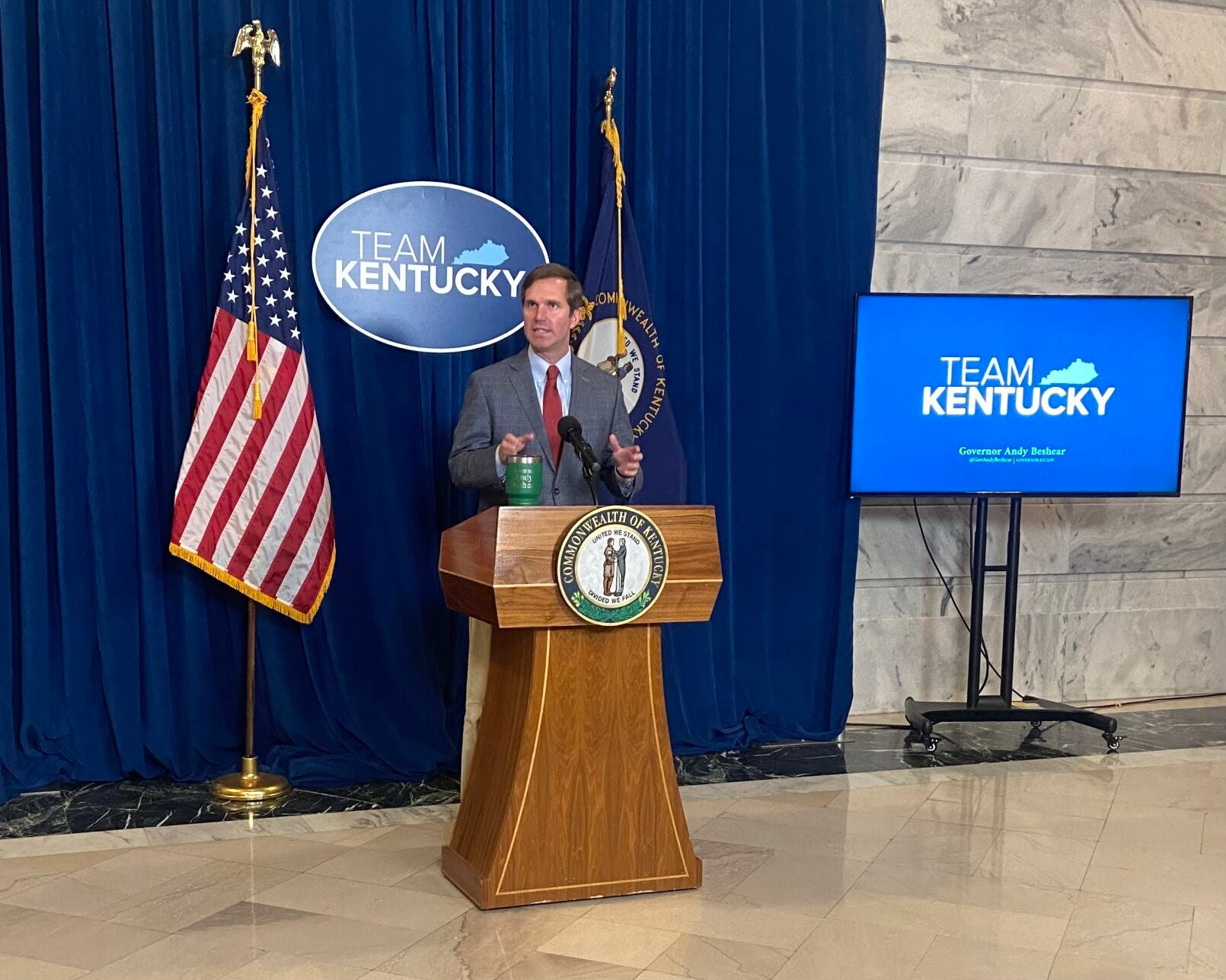The Governor’s Race: Beshear and Cameron on the economy and workforce development
Published 4:05 pm Friday, September 1, 2023

- Attorney General and Republican Governor Candidate Daniel Cameron shares his economic plan, Vision for Prosperity, on Wednesday, Aug. 30, in Louisville. (Sarah Michels, Bowling Green Daily NEws)
This is the second article in a weekly series covering the top issues Kentuckians consider before they head to the polls in November. The governor’s race will delve into candidates’ stances on various issues, and whether their record matches their words and promises.

Gov. Andy Beshear speaks at his weekly Team Kentucky presser on Thursday, Aug. 31, in the Capitol Rotunda in Frankfort, Kentucky. (Sarah Michels, Bowling Green Daily News)
Each week, Democratic Gov. Andy Beshear rattles off a laundry list of economic successes achieved during his administration.
He recently announced that Kentucky has achieved a record-breaking General Fund surplus of $1.55 billion and rainy day fund balance of $3.7 billion – 27 times higher than when he took office.
He often says that Kentucky is in the midst of at least the third best economic year in state history, after a record breaking two years in 2021 and 2022.
In his remarks, Beshear also typically mentions the fact that Kentucky currently has the most jobs filled in state history, in addition to a historic $27 billion investment in new private-sector new location and expansion projects that have created 47,500 new jobs during his administration.
Republican Attorney General Daniel Cameron shares the flip side of the economic coin.
Cameron has connected Beshear’s economic policies with President Joe Biden’s, saying in a press conference Thursday that a vote for Beshear is a vote for inflation, spiking gas prices, taxes on working families and a growing welfare state.
He often shares that there are fewer Kentuckians working today than when Beshear took office pre-pandemic, and that the Kentucky workforce participation rate – 57.7% in July 2023, according to the U.S. Bureau of Labor – is one of the worst in the nation.
What are the candidates’ stances on key economic and workforce development issues?
The income tax
In 2022, the Kentucky state legislature decided to begin the process of eliminating the income tax.
House Bill 8 codified the first drop, from a 5% to a 4.5% income tax rate beginning in 2023, with the intention of cutting an additional half percentage point each year, as long as certain budgetary conditions were met.
It also added sales taxes on 35 different services and industries to help pay for the cut.
Beshear vetoed the bill, stating in his veto message that he did not support the additional sales taxes on things like criminal background checks, conferences and events, summer camps, youth sports and hybrid and electric vehicles.
“The General Assembly should be supporting Kentucky’s growing industries and events that promote the commonwealth, not targeting them with tax increases,” he wrote.
He said the bill “threatens Kentucky’s economic future,” citing Kansas, which eliminated its income tax in 2012 but rolled the cuts back five years later due to an inability of the state to provide essential public services.
Republican state legislators have argued that Kansas’ failure was because it moved too quickly, and that Kentucky’s elimination process is intentionally slower to avoid similar issues.
In 2023, the General Assembly continued the income tax reductions, now set to drop to 4% in 2024. This time, Beshear signed the bill.
In a video, he told Kentuckians that though he was concerned about “long term repercussions for potentially funding state services” and that he would have rather cut sales taxes, he wanted to provide some inflationary relief for Kentucky families and that was his only way to do so.
Cameron, for his part, said that he would be the governor that eliminated the income tax for good. He said continuing on that path would be his budget priority if elected.
Thursday, the State Budget Office announced that Kentucky did not meet the conditions to drop the income tax from 4% to 3.5% in 2025.
Beshear said that Cameron’s plan to go to zero would require a “massive sales tax increase, which is what he would do, or the gutting of K-12 education, higher education and health care coverage for millions of Kentuckians.”
Cameron also criticized Beshear on his tax policies.
“This governor can’t veto tax cuts and budget reserves and then go on to take credit for every new job in Kentucky,” he said Wednesday.
Cameron’s vision for prosperity
Cameron shared several other points in his economic plan Wednesday.
One of the major points was establishing work requirements for Kentucky’s able-bodied Medicaid recipients, who are not pursuing an education or taking care of family.
He added that he would keep the Medicaid expansion established under the Affordable Care Act.
He wants welfare programs for able-bodied Kentuckians to be a temporary transition state, he said.
“My administration will build our resources to help welfare recipients get back into the workforce and avoid the benefits cliff, the point where benefits drop off as a result of increased earnings,” Cameron said. “No one, I mean no one, should be punished for a hard day’s work here in Kentucky.”
Beshear responded to Cameron’s Medicaid plan on Thursday, saying that it could remove 100,000 Kentuckians from the health care program.
“When asked about it, he didn’t know how he was going to do it,” Beshear responded. “I guess he’s just heck-bent on ensuring that 100,000 Kentuckians can’t go to a doctor when they’re sick.”
Beshear tried to expand Medicaid to dental, hearing and vision in 2022, but the state legislature overruled his expansion in 2023. Beshear has continued to try to revive the plan.
Several other key points in Cameron’s plan include:
- Protection of Kentucky’s coal industry, a loss of which he said would “devastate” the economy;
- working with the next attorney general on child support services to get parents back to work, like a plan to “develop fatherhood initiatives to keep both parents engaged with their children;”
- a focus on education as the foundation of a strong workforce, to include empowerment of parents and additional opportunities and choice for students;
- A push against Diversity, Equity and Inclusion oversight and strategies in the workplace to “bring common sense back to government;” and
- a willingness to fight against “federal overreach” harming Kentucky’s economy.
When asked to respond to the plan, Beshear compared his record as governor to Cameron’s “posters with platitudes.”
“When it comes to jobs, when it comes to economic development, we are on a historic winning streak,” he said. “And when you’re on a historic winning streak, you don’t fire the coach, you put that team out there to rack up wins and bring home championships, and that’s what we’re doing in Kentucky.”

